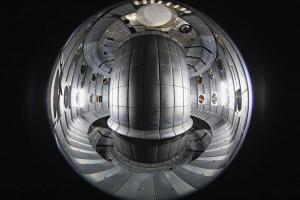TCV tokamak turns 30
The Swiss TCV tokamak (for Tokamak à Configuration Variable, or "variable configuration" tokamak) has been exploring the physics of nuclear fusion for 30 years and training generations of students in the process.
An integral part of the Swiss Plasma Center at EPFL (the Swiss Federal Institute of Technology Lausanne), TCV has a staff of about 200 researchers and students.
The mission of the TCV program, according to a press release issued this month, is to apply the device's highly specialized plasma shaping capability to develop new plasma configurations and plasma shapes. Combined with a wide range of versatile heating and current drive schemes and up-to-date measurement and control systems, TCV is a powerful tool to explore the physics of magnetically confined plasmas. Research on TCV supports experimental reactors under construction, such as ITER, and also investigates new and alternative avenues in view of future prototype power plants.
"Our work at the Swiss Plasma Center over the past 30 years has provided key insights into plasma behaviour," says Director Ambrogio Fasoli. "The TCV plays a vital role in this endeavour. Recent upgrades to its infrastructure have expanded our capability to investigate key issues for ITER, DEMO, and future fusion reactors."
Because EPFL's tokamak is a "variable configuration" reactor, scientists can use it to observe how changes in plasma configuration affect the plasma's properties like temperature and confinement quality or to study new plasma configurations. TCV can also be used to evaluate different configurations for divertors, an essential component for plasma exhaust in a fusion reactor. The Swiss Plasma Center recently teamed up with Google DeepMind to develop a new magnetic control method for plasmas, based on deep reinforcement learning, and successfully applied it to real-world plasma configurations in the TCV tokamak for the first time.
"The challenges ahead are substantial," says Fasoli, "but we are well-positioned to make significant contributions to the development of fusion energy as a critical component of the future global energy mix."
Read the full press release here.


